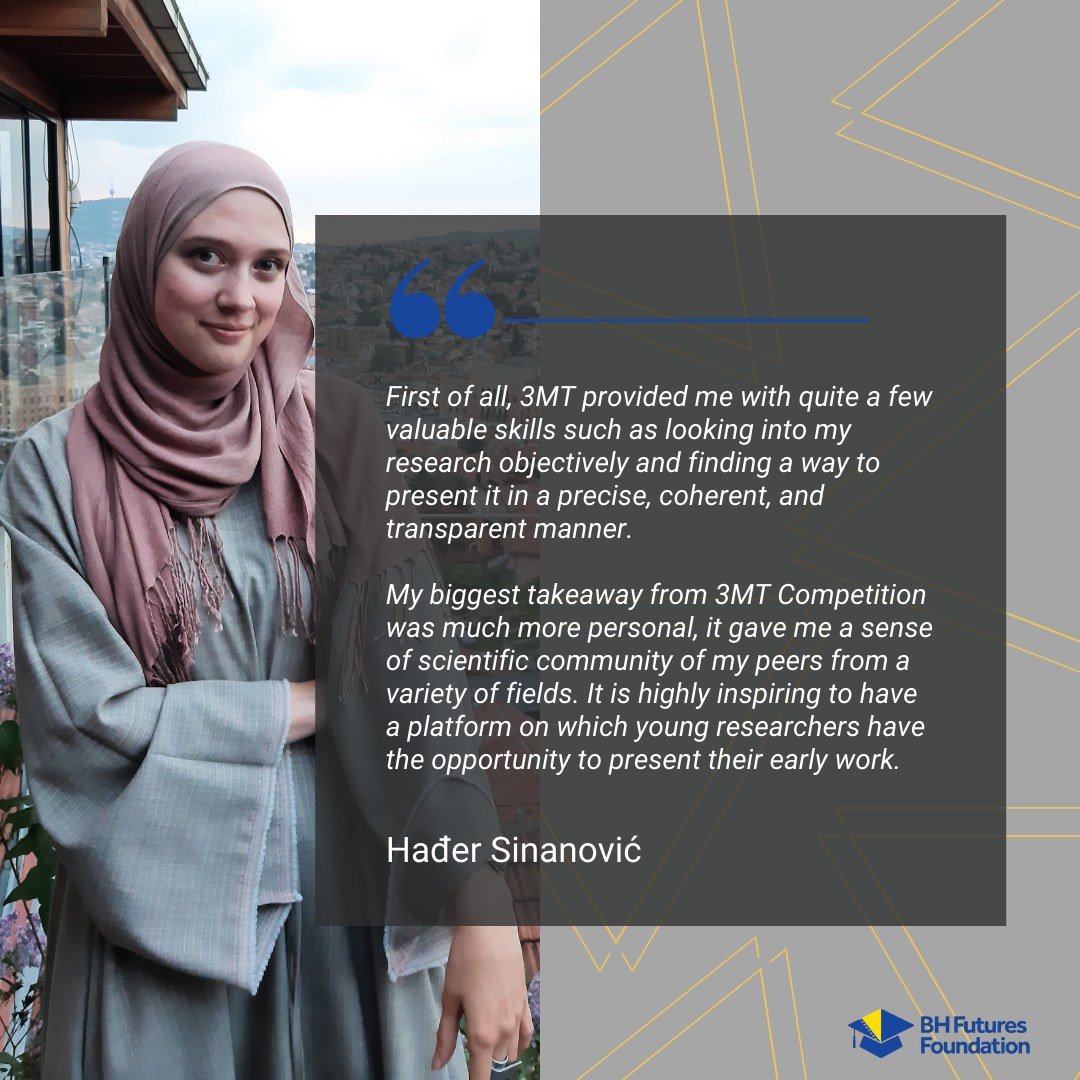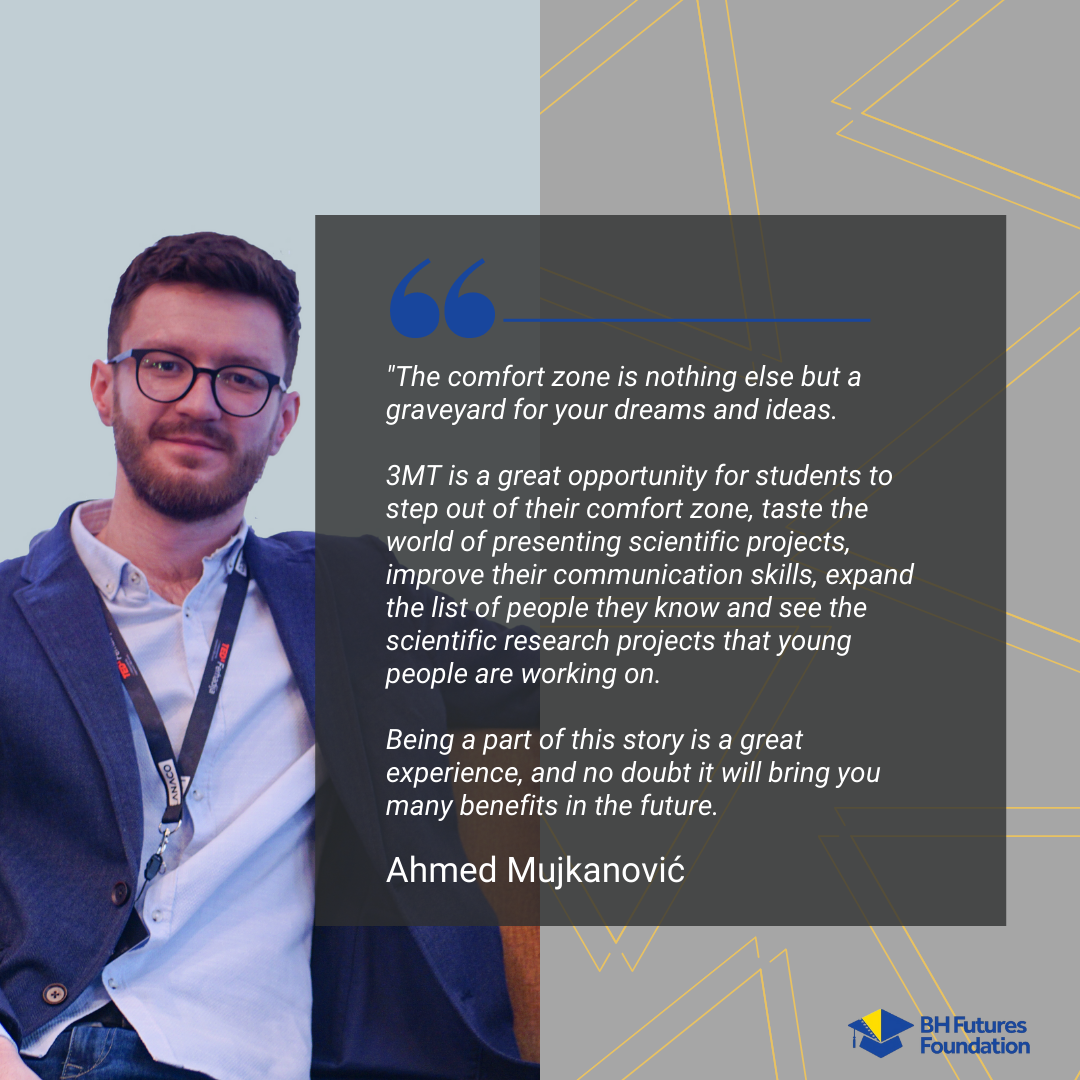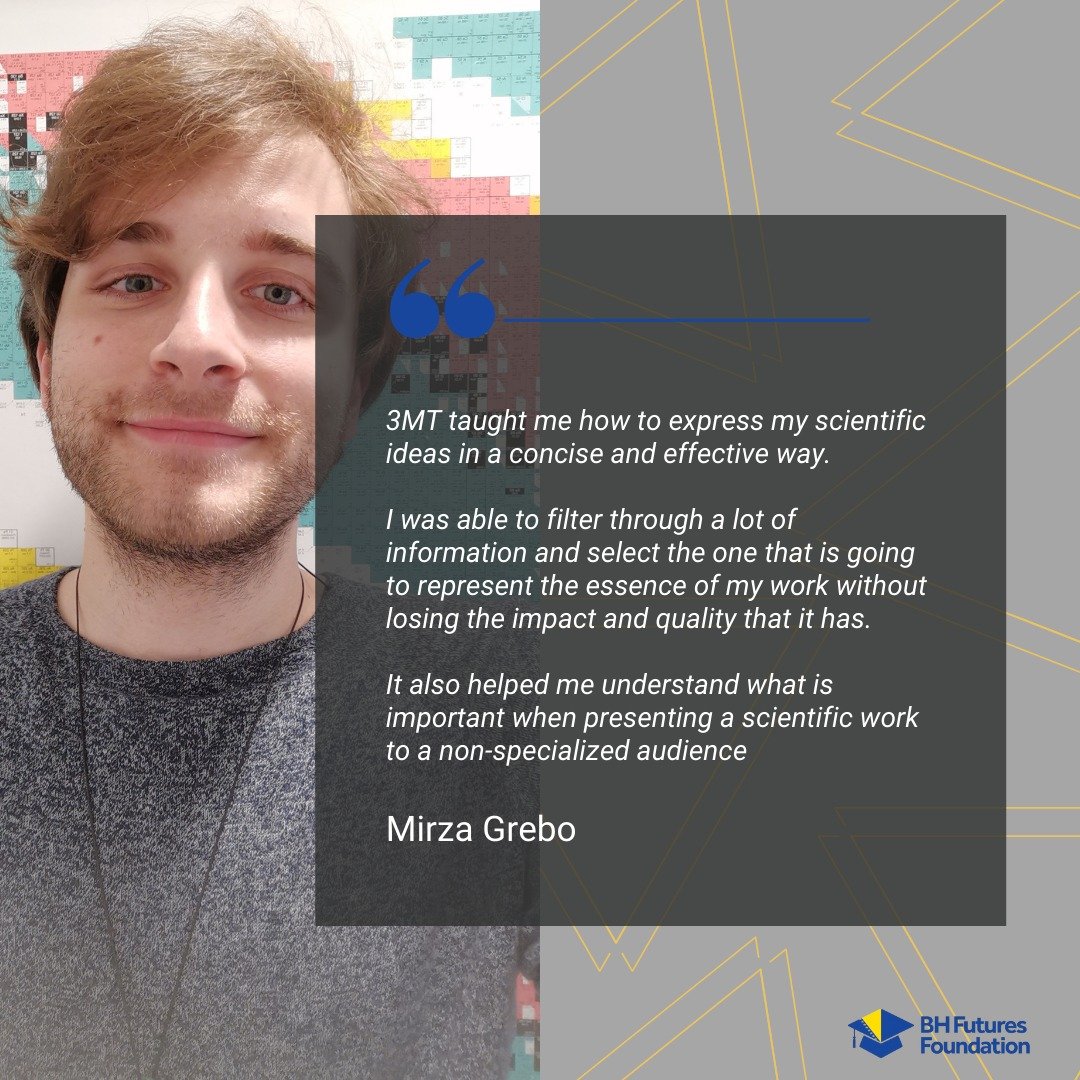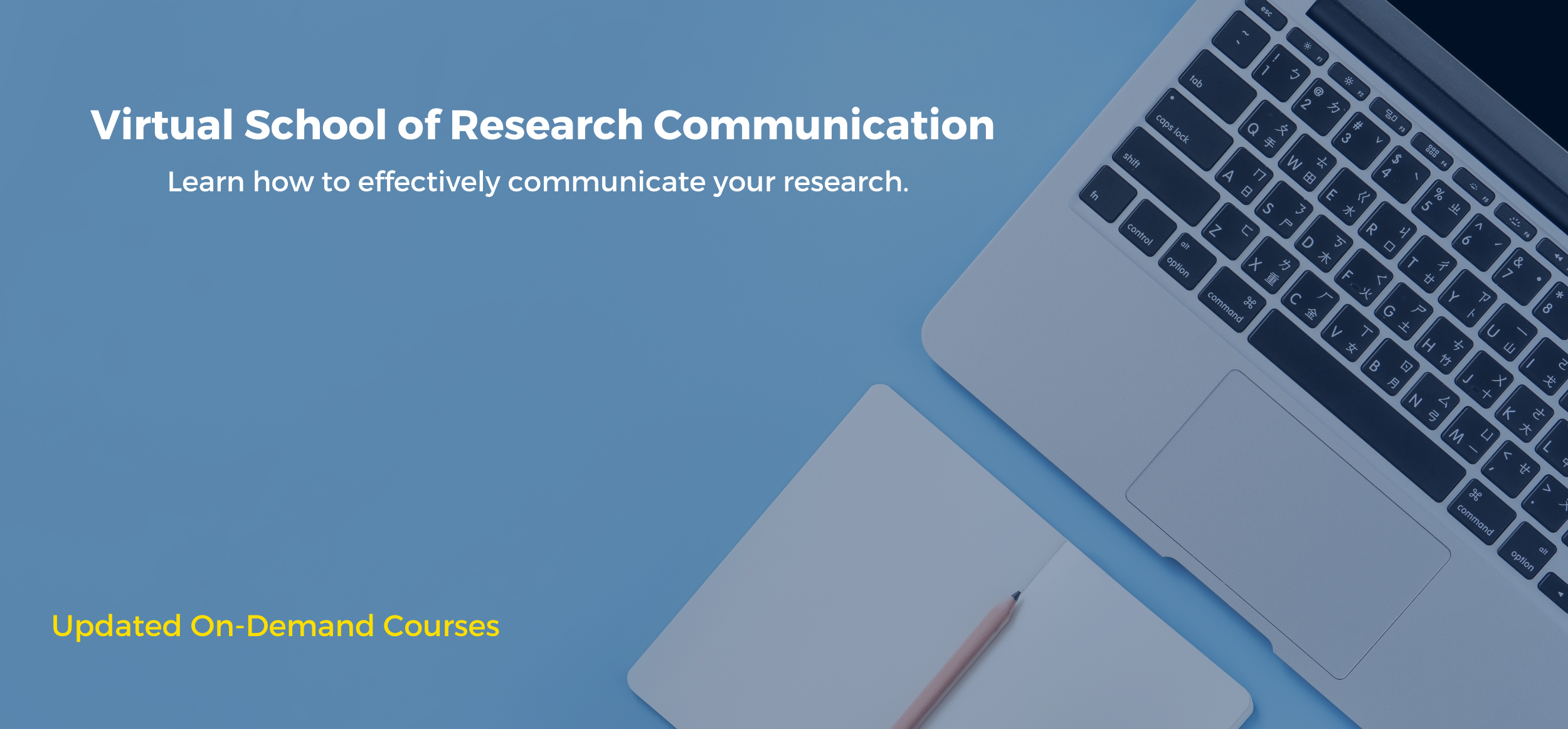ORGANIZING SPONSORS
FRIENDS OF 3MT
“The 2023 Bosnia & Herzegovina three-minute thesis (3MT) competition challenges students (Ph.D., Masters & Undergraduate) to communicate the significance of their research projects to a non-specialist audience in just three minutes and compete for over 20 000 BAM prize money.”
Applications will be open on April 15, 2024. Awards Ceremony: June 15, 2024.
The 2024 Bosnia & Herzegovina 3MT competition provides Bachelor, Masters & Ph.D. students with the opportunity to develop their academic, presentation, research communication and community leadership skills by explaining their research to a non-specialist audience. In 2020, we successfully organised the inaugural competition in which Ph.D. students were the competitors. Following the success of the 2020 edition, we organised an equally successful competition for undergraduate/masters student researchers in the homeland but also abroad. The 3MT competition will be held virtually to allow anyone from anywhere to compete. Not only will students benefit from this experience, but their respective universities/faculties will have the opportunity to showcase their research and researchers throughout the Bosnia & Herzegovina network, as well as open doors to new collaborations and networks for both researchers and supervisors.
Students will have a maximum of three minutes to deliver a compelling presentation of one of the following:
Undergraduate, masters or Ph.D. dissertation (project) topic
Any other project/topic that was/is the part of their undergraduate/master dissertation
Any undergraduate or masters project (not just thesis) that has an element of research
3MT is not an exercise in trivializing or ‘dumbing-down’ research but forces students to consolidate their ideas and crystalize their research discoveries.
The competition will be judged by a local & international panel consisting of industry and academic professionals.
Why are we organising the 3MT competition and what do we hope to achieve?
The primary objective of the 3MT initiative will be to bring talented young undergraduate, masters & Ph.D. researchers with Bosnia & Herzegovina origins together under one umbrella with Bosnia & Herzegovina origins and give them a platform to:
Engage with each other and a greater researcher community
Build a community of young researchers and lay the foundations for future collaboration
Disseminate important research information to the general public
Build partnerships and friendships between collaborating organisations
Showcase the global research excellence of Bosnia & Herzegovina
Boost personal careers by gaining visibility and improving communication skills
Connect prospective students with world-class researchers of Bosnia & Herzegovina origins
Why you should participate?
Participation in the 3MT competition will allow students to develop many different skills. Former competitors have commented on the value of their experience in a variety of areas. Some highlighted reasons why you should participate:
Drastically improve your presentation skills and public speaking. Overcome public speaking anxiety and practice this important skill
Learn how to or enhance your research communication ability. Learn to effectively explain the breadth and significance of complex research to a non-specialist audience
Research perspective: Seeing how a research project fits within the larger picture is an important skill set. Distilling a research project into a three-minute general audience presentation allows participates to gain new perspectives on their research and helps contribute to their research and writing process
Build a global network: get to know other competitors from around the world, discuss your research and build long term friendships
Build key skills that are highly valued by employers in many sectors. These skills, such as public speaking and communication skills, can be featured prominently in application documents
Check out some great examples from our previous 3MT Competitions
How can you prepare yourself?
Virtual School of Research Communications
To better prepare for your 3MT presentation, we have created a specialized course. The Virtual School of Research Communications aims to educate participants on how to effectively communicate their research work to any audience and spark interest in the domain. The course is free and available on the Bosnia and Herzegovina Futures Foundation's course platform Futures e-Academy on demand. You can enroll here. Read more about VSRC here.
Competition Rules
Undergraduate and Master students can present any project/assignment that was/is part of their official studies that contains elements of originality (literature surveys or reports without original/critical analysis are not appropriate). The kind of projects students can present will vary depending on a particular field of study (e.g. experimental or theoretical research, critical essay/report, artistic research)
Ph.D. student should present their doctoral research work only
Presentations are to be done in English (the international language of research) or local languages (Bosnian/Croatian/Serbian). However: Preference should be English
Presentations are limited to 3 minutes and competitors exceeding 3 minutes will not be allowed to compete
A single static slide (Visual aid) is permitted (no slide transitions, animations or 'movement' of any description)
The video can be recorded at home or another venue but must have only one camera angle filmed from a static position. You must be visible when presenting
The 3-minute audio must be continuous – no edits breaks etc. (This is why you must be visible at all times)
Presentations are considered to have commenced when a presenter starts their presentation through movement or speech
No additional electronic media (e.g. sound and video files) are permitted within the video recording. The focus is on your presentation skills
The decision of the judging committee is final
Judging
The judging is broken up into two sections with 5 criteria each. Each section is equally weighted. Each sections will be marked out of 5 (1 = weak, 5 = outstanding) and you will receive a score total out of 50. Judges will also provide comments for each presentation that can be used as justification for scores. Feedback can be provided to students upon request once the competition has concluded.
Comprehension and content
Did the presentation provide an understanding of the background and significance to the research question being addressed, while explaining terminology and avoiding jargon?
Did the presentation clearly describe the impact and/or results of the research, including conclusions and outcomes?
Did the presentation follow a clear and logical sequence?
Was the thesis topic, research significance, results/impact and outcomes communicated in language appropriate to a non-specialist audience?
Did the presenter spend adequate time on each element of their presentation - or did they elaborate for too long on one aspect or was the presentation rushed?
Engagement and communication
Did the oration make the audience want to know more?
Was the presenter careful not to trivialise or generalise their research?
Did the presenter convey enthusiasm for their research?
Did the presenter capture and maintain their audience's attention? Did the speaker have sufficient stage presence, eye contact and vocal range; maintain a steady pace, and have a confident stance?
Did the Visual Aid (slide/image) enhance the presentation - was it clear, legible, and concise?
Please note: Competitors *will not* be judged on video/ recording quality or editing capabilities (optional inclusions). However, your presentation must be audible. Judging will focus on the presentation, ability to communicate research to a non-specialist audience, and 3MT visual aid (slide/image).
Please note: As decided by the judging committee, if an applicant does not have a slide/visual aid, then the mark for the previous category will be doubled.
Judges
Emina Alickovic, Department of Electrical Engineering Linköping University, Sweden
Amra Hasečić, University of Sarajevo - Faculty of Mechanical Engineering
Ajla Akšamija, University of Utah
Zlatan Akšamija, University of Utah
Amir Tabakovic, Revolution Road Ltd
Lejla Alic, University Of Twente
Vedad Hadziavdic, Wintershall Dea
Vedrana Mladina, New York University Abu Dhabi
Eldad Herceg, Dow Chemical
Haris Krijestorac, HEC Paris
Milan Vrućinić, Accenture
Nerma Caluk, Skidmore Owings & Merrill
Ms, Dr. Smirna Malkoč, University of Teacher Education Styria
Dženeta Karabegović, University of Salzburg
Sandra Hasanefendic, Vrije Universiteit Amsterdam
Nina Đumrukčić, University of Cologne
Belma Bourne, Walt Disney World and Nova Southeastern University
Merisa Nisic, Propel Health Communications
Sandra Selmanovic, Munich University of Applied Sciences and Anglia Ruskin University
Nina Adjanin, Northwest Missouri State University
Larisa Kurtović, UNIVERSITY OF OTTAWA
Dr. Amela Dizdarevic, IBM / Technische Hochschule Ingolstadt
Hasan Zahirović, Silesian Univerzity, Czech Republik
Rijad Sarić, La Trobe University
Martina Trogrlić, TU-Graz/RCPE GmbH
Amra Salihbegović, Polytechnic University of Milan
Una Tanović, University of Massachusetts Amherst
Merima Nurkanović Hot , Allianz Deutschland
Farah Kamberovic, Vall d´Hebron Institute of Oncology, Hospital Vall d´Hebron, Barcelona
Mirza Ramić, GRUNDFOS
Prof Ahmed Kovacevic, City, University of London
Belma Kalamujić Stroil, University of Sarajevo-Institute for Genetic Engineering and Biotechnology
Danijela Bjelogrlic, Southern New Hampshire University
Sabit Delić, MLL Munich Leukemia Laboratory
Azra Mujić-Delić, Genmab
Muhamed Mulahmetović, Trinity College Dublin
Dženan Zukić, Kitware Inc.
Nirvana Pištoljević, EDUS-Education for All
Harun Muhić, 360dialog
Kristina Jajčević, EASL
Amela Delić Aščić, University of Tuzla
Almir Aljović, University of Munich
Edin Golubovic, EnOcean GmbH
Amila Akagic, University of Sarajevo
Maja Babić , University of Groningen
Emir Nazdrajić, University of Waterloo
Kenan Tokmic, Entegris
Nejra Ćosić-Mujkanović, Medical University of Graz, Pharmacology
Đenita Kuštrić-Kurtić, University of Sarajevo, Academy of Fine Arts
Tarriq Purivatra, Autodesk
Mirza Grebo, UC Berkeley
Faruk Šehić
Nerkez Opacin, RMIT University
Riad Hajdarevic, Oslo University Hospital
Emil Knezović, International University of Sarajevo
Anela Topčagić, University of Sarajevo, Faculty of Science
Svetlana Pelemiš, University of East Sarajevo, Faculty of Technology
Maja Arslanagić-Kalajdžić, University of Sarajevo
Ajla Ališah, University of Sarajevo- Veterinary faculty
Azra Frkatović-Hodžić, Genos
Zerina Kurtović, Karolinska Institutet
Elmedin Selmanović, University of Sarajevo - Faculty of Science
Jelena Šimunović, Genos Ltd
Demir Bektic, International University of Monaco
Samir Foric, University of Sarajevo
Edin Husic, IDSIA
Merima Šabanović, Weill Cornell Medical College
Amina Tucak-Smajić, University of Sarajevo - Faculty of Pharmacy
Mirjana Šipovac, Faculty of Technology Zvornik, University of East Sarajevo
Ismar Lutvikadic, University of Sarajevo - Veterinary Faculty
Sabina Hodžić, University of Rijeka/Faculty of Tourism and Hospitality Management
Kemal Aganovic, DIL German Institute of Food Technologies e.V.
Vedran Karahodžić, Faculty of Electrical Engineering, University of Sarajevo
Andi Alijagic, Örebro University
Amra Jahić, Helmut Schmidt University, Hamburg, Germany
Edin Smailhodžić, University of Groningen
Ajla Džanko, University of Kyoto, Japan
Amir Čaušević, University of Sarajevo/Faculty of health sciences
Senada Zatagić, MEF University Istanbul
Haris Piplaš, ETH Zurich / Drees&Sommer
Damir Hamamdzic, Johnson and Johnson
Rijad Kaniža, University of Sarajevo - Academy of Music & Institute for Contemporary Artistic Music INSAM
Dr. Zlatan Mujagić, Maastricht University Medical Center
Želimir Husnić , Boeing, BDS
Amar Ćemanović, Istanbul Technical University
Dalila Destanović, Yale University
Tanja Sovic, TU Wien
Emma Pinjić, Beth Israel Deaconess Medical Center
Amel Duraković, Institute of Physics of the Czech Academy of Sciences
Helena Mihaljević, Hochschule für Technik und Wirtschaft Berlin
Zlatan Mujkić, Euro Bau d.o.o.
Maja Varatanović, Veterinary faculty, University of Sarajevo
Merima Balic, Schweizer Zahnarzt
Azra Bihorac, University of Florida
Ines Dedović, Jonas & Redmann
Hana Hodžić, Faculty of Electrical Engineering Sarajevo
Vahida Velić, European Astronaut Centre
Saša Mrdović, Elektrotehnički fakultet, Unverzitet u Sarajevu
Mirza Pasic, University of Sarajevo - Faculty of Mechanical Engineering
Mirza Hebib, University of Sarajevo
Zlatan Stanojević, Global TCAD Solutions GmbH
Merima Čaušević, University of Sarajevo - Faculty of Educational Sciences
Adis Muminovic, University of Sarajevo - Faculty of Mechanical Engineering
Belma Memić, University of Sarajevo Faculty of traffic and communications
Nasir Muftić , University of Sarajevo
Ermin Muharemović, University of Sarajevo - Faculty of traffic and communication
Marija Mitrović, University of East Sarajevo, Faculty of Technology
Lejla Panjeta, University SSST
Almir Osmanović, Faculty of Mechanical Engineering Tuzla
Irmina Sefić Pašić, Clinical Center University of Maribor
Anes Karić
Amra Kožo, University of Sarajevo - School of Economics and Business
Bartolomej Stanković, Music Academy of East Sarajevo
Arman Korajac, University of Ljubljana & Jožef Stefan Institute
Who can apply?
Born in Bosnia & Herzegovina / Have Bosnian citizenship or be considered diaspora (For example, if you were born in the USA but draw roots from Bosnia & Herzegovina you are eligible). You are also eligible if you were born in Bosnia & Herzegovina but are undertaking your undergraduate, master studies or Ph.D. in another country or in BH
Currently enrolled into an undergraduate/masters program OR completed studies in the last 12 months
Any discipline is eligible
Students who have not already presented the same or similar research in some of our previous 3MT competitions
Awards
We recognize the importance of this competition, its significance for research in the Bosnia & Herzegovina global community but also value your work and time.
Ph.D., Bachelor and Masters students will be judged separately.
There will be two types of awards. The first is judging conducted by an independent committee of academics and the second category of awards will be judged by the public.
Public voting is counted by the number of thumbs up on your YouTube video.
Undergraduate/Masters/Ph.D. total award pool is up to 20,000 BAM.
Awards for Ph.D. candidates
1st Place - 3000 BAM
2nd Place - 2000 BAM
3rd Place - 1000 BAM
Awards for Master candidates
1st Place - 1500 BAM
2nd Place - 1000 BAM
3rd Place - 500 BAM
Awards for Bachelor candidates
1st Place - 1500 BAM
2nd Place - 1000 BAM
3rd Place - 500 BAM
Awards (judged by the public via YouTube)
Best overall presentation as judged by public (Ph.D.) - 1000 BAM
Best overall presentation as judged by public (Masters) - 500 BAM
Best overall presentation as judged by public (Bachelor) - 500 BAM
Best overall presentations – Special Awards
Best overall STEM presentation - 500 BAM
Best overall Humanities/Arts presentation - 500 BAM
Best overall Medical/Physical Sciences presentation - 500 BAM
Best overall Business/Economics/Law presentation - 500 BAM
3MT Alumni Choice Award – 500 BAM
Submission details & Application
Videos will be submitted by applicants via a website form (given below). The competitor should provide a link so that we can download your video. (please ensure your link is not set to private)
Your video submission can be in English or local languages (Bosnian/Croatian/Serbian).
If your video submission is in English, you will need to provide Bosnian/Croatian/Serbian closed caption or .srt file.
If your video submission is in Bosnian/Croatian/Serbian, you will need to provide English closed caption or .srt file.
There will be an initial screening to see eligibility and quality upon which the videos will be uploaded to our YouTube channel.
Videos will be uploaded on our YouTube channel and ready for full public sharing. This will be the primary hosting of videos.
In the Google form below, we must seek permission for the presentations to be publicly shared. Each competitor will need to make sure they check this with their supervisors and institutions. If selected into the finals, competitors will be notified. Their video shall be uploaded on the competition official YouTube channel.
Important Dates
applications open: April 15th - MAY 5TH, 2024
judging process and voting period: MAY 20th - June 9th, 2024
3MT Awards Ceremony and result announcement: June 15th, 2024 (online)
3MT & Research Meetup Sarajevo: June 22nd, 2024
























